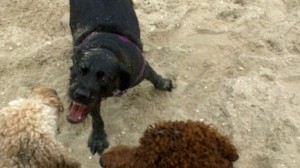Make your dog happy, by enacting the wolf’s predator modes
 Dogs are programmed from evolution to enact part of the wolves 7 predator mode sequence. Find out which part your dog specializes in, and make it very happy!
Dogs are programmed from evolution to enact part of the wolves 7 predator mode sequence. Find out which part your dog specializes in, and make it very happy!
I think if you even consider this a little bit you will realise how obvious it is that a domestic dog would retain the behavior from its ancestor. Its just that as owners, we like to often think of our dogs as cute cuddly things that could do no harm.
I am not saying that you all have wild deadly animals, but let’s face it, they were designed to be pretty great hunting machines, and on the hunt, the main thing a wolf does each day, they were pretty good at it. Going for long hours each day, to ensure the pack survived.
If you have gotten your dog daily exercise and raw food diet sorted, then this theory may be the next biggest piece of the puzzle to making your dog happy.
If you accept that domestic dogs are evolved from wolves, and that it only happened 15,000 years or so, you will also appreciate that our little dogs share the majority of the wolf’s behaviour still set.
You will see it in how they turn around in circles before sitting, how they enjoy running as a pack, how they mark the ground near where they poo, how they mark vertical surfaces with urine.
But have you thought about what your dog really needs?
Sure your dog may enjoy a game of ‘chassy’ around the house or being squirted with water. Some even enjoy a bubble machine in summer, but these are merely diversions that us humans have thought up, or see our dogs react to.
What Dogs really love
It turns out that some very clever researchers have found out that what most satisfies dogs is enacting a version of the hunt. The wolf hunt that is. You see they have only recently evolved from wolves, and wolves pretty much play, track and kill and eat their prey, and sleep. They take the whole tracking thing very seriously as they need to feed a whole pack and it’s all about survival.
So while we often over feed or restrict our dogs diets, and they don’t often have to work very hard to get food in their bowl, their main instincts are all about honing how to track and hunt down prey.
What the researchers have found is that every one of the recognised breeds has either higher or lower level of skill in the seven skills wolves use in their hunt.
Sorry to do this to you, but I thought it would be better to put the table of the seven characteristics in the next blog, so you could concentrate on it there …